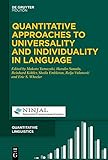Quantitative Approaches to Universality and Individuality in Language / ed. by Makoto Yamazaki, Haruko Sanada, Reinhard Köhler, Sheila Embleton, Relja Vulanović, Eric S. Wheeler.
Material type: TextSeries: Quantitative Linguistics [QL] ; 75Publisher: Berlin ; Boston : De Gruyter Mouton, [2022]Copyright date: ©2023Description: 1 online resource (VIII, 229 p.)Content type:
TextSeries: Quantitative Linguistics [QL] ; 75Publisher: Berlin ; Boston : De Gruyter Mouton, [2022]Copyright date: ©2023Description: 1 online resource (VIII, 229 p.)Content type: - 9783110628081
- 9783110763638
- 9783110763560
- P204 .Q36 2023.
- online - DeGruyter
- Issued also in print.
| Item type | Current library | Call number | URL | Status | Notes | Barcode | |
|---|---|---|---|---|---|---|---|
 eBook
eBook
|
Biblioteca "Angelicum" Pont. Univ. S.Tommaso d'Aquino Nuvola online | online - DeGruyter (Browse shelf(Opens below)) | Online access | Not for loan (Accesso limitato) | Accesso per gli utenti autorizzati / Access for authorized users | (dgr)9783110763560 |
Frontmatter -- Editors’ Foreword -- Contents -- Why does negation of the predicate shorten a clause? -- The co-effect of Menzerath-Altmann law and heavy constituent shift in natural languages -- Does the century matter? Machine learning methods to attribute historical periods in an Italian literary corpus -- Too much of a good thing -- Linguistic laws in Catalan -- Dating and geolocation of medieval and modern Spanish notarial documents using distributed representation -- Cross-modal authorship attribution in Russian texts -- Free or not so free? On stress position in Russian, Slovene, and Ukrainian -- Unpacking lexical intertextuality: Vocabulary shared among texts -- The Menzerath-Altmann law in the syntactic relations of the Chinese language based on Universal Dependencies (UD) -- Statistical tools, automatic taxonomies, and topic modelling in the study of self-promotional mission and vision texts of Polish universities -- Quantitative characteristics of phonological words (stress units) -- Explorative study on the Menzerath- Altmann law regarding style, text length, and distributions of data points -- Quantitative analysis of the authorship problem of “The Tale of Genji” -- Revisiting Zipf’s law: A new indicator of lexical diversity -- A time-series analysis of vocabulary in Japanese texts: Non-characteristic words and topic words -- Authors’ addresses -- Name index -- Subject index
restricted access online access with authorization star
http://purl.org/coar/access_right/c_16ec
Quantitative linguistic research reveals fascinating patterns in contemporary and historical linguistic data. The book offers insights from a broad range of languages, including Japanese, Slovene and Catalan. The reader is convinced that statistic empirical analysis – and increasingly also machine learning and big data – should be an essential part of any serious linguistic enquiry.
Issued also in print.
Mode of access: Internet via World Wide Web.
In English.
Description based on online resource; title from PDF title page (publisher's Web site, viewed 25. Jun 2024)


